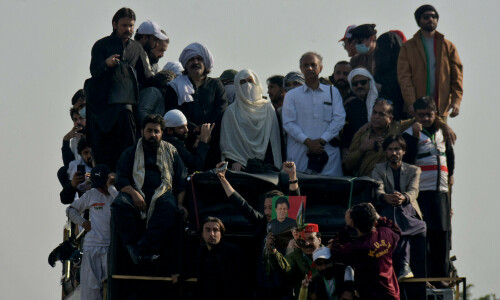WASHINGTON, March 27: President Pervez Musharraf met Taliban ruler Mullah Omar in April 2000 to convince him to expel Osama bin Laden but failed, says an official US report. The report, released by a commission investigating the Sept 11, 2001, terrorist attacks in the United States , says the meeting took place on the request of the former US President Bill Clinton.
When Mr Clinton visited Pakistan on March 25, 2000, he raised the Osama bin Laden issue in his meeting with President Musharraf.
"The Pakistanis asked for evidence that bin Laden had really ordered the US embassy bombings (in East Africa) a year and a half earlier. In a follow-up meeting the next day with Under Secretary of State Thomas Pickering, President Musharraf argued that Pakistan had only limited influence over the Taliban," says the report.
Despite these reservations, "President Musharraf did meet Mullah Omar and did urge him to get rid of bin Laden," the report said.
In early June 2000, according to the report, Pakistan's interior minister went to Kandahar with Mr Pickering and delivered a joint message to Taliban officials. "But the Taliban seemed immune to such pleas, especially from Pakistani civilians like the interior minister," the report observes. "Pakistan did not threaten to cut off its help to the Taliban regime."
The report also provides so far classified information about joint US and Saudi efforts to influence the Taliban regime on this issue.
Their first joint effort to evict the Al Qaeda chief from Afghanistan began in May 1998 when President Clinton designated CIA Director George Tenet as his representative to work with the Saudis on terrorism.
Mr Tenet met Saudi Crown Prince Abdullah twice, in May and June, and convinced him to make an all-out secret effort to persuade the Taliban to expel Osama for eventual delivery to the United States or another country.
Riyadh decided to send Saudi intelligence chief Prince Turki bin
Faisal as Prince Abdullah's special emissary to Kandahar. He also took with him a sealed indictment against Osama issued by a New York grand jury.
Prince Turki held several meetings with Mullah Omar and other Taliban leaders in the summer of 1998. Employing a mixture of possible bribes and threats, he received a commitment that Osama would be handed over, the report said.
After the embassy bombings in August 1998, US Vice President Al Gore called Riyadh again to underscore the urgency of bringing the Saudi ultimatum to a final conclusion.
"In September 1998 Prince Turki, joined by Pakistan's intelligence chief, had a climactic meeting with Mullah Omar in Kandahar. Mullah Omar reneged on his promise to expel bin Laden. When Prince Turki angrily confronted him, Mullah Omar lost his temper and denounced the Saudi government. The Saudis and Pakistanis walked out," the report said.
The Saudi government then cut off any further official assistance to the Taliban regime, recalled its diplomats from Kandahar, and expelled Taliban representatives from the Kingdom. The report, however, observes that Pakistan did not sever its relations with the Taliban.
"Iran was already on the verge of going to war against the Taliban. The Saudis and Pakistanis feared that a further break might encourage Iran to attack. They also wanted to leave open room for rebuilding ties if more moderate voices among the Taliban gained control," the report notes.














































Dear visitor, the comments section is undergoing an overhaul and will return soon.